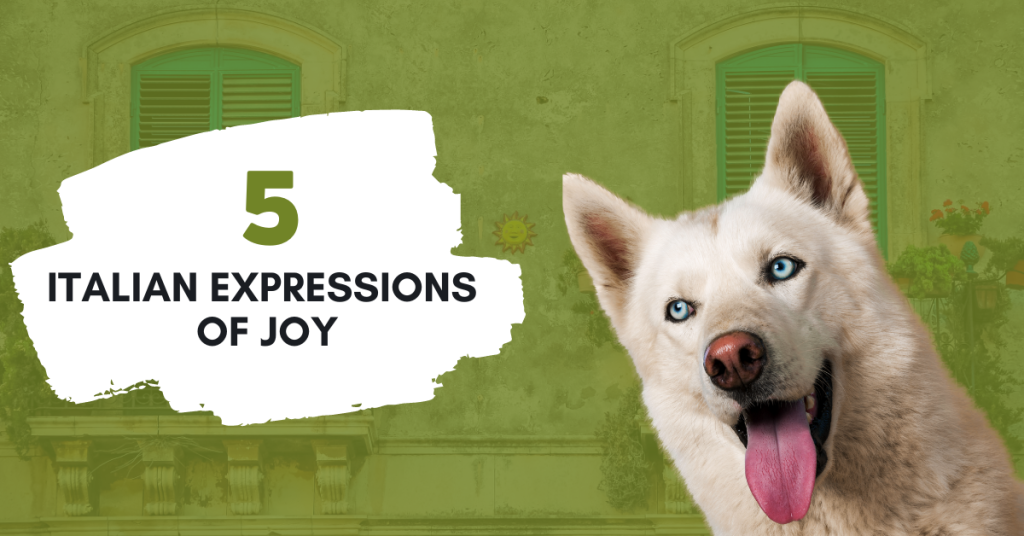Italians are filled with joy. In Italy, not only will you see people “talking with their hands” while walking down the street in Rome, but you’ll also hear very intriguing Italian expressions of joy.
And even if you’ve been studying Italian for a while, the literal translation of these expressions can be quite misleading.
Let’s clear that up a bit with the most common Italian expressions of excitement or joy.
5 Italian Expressions Of Joy to Master Your Italian
1. Essere al settimo cielo
Mamma e Babbo, sono al settimo cielo! Benvenuta Giulietta Rossi 🤍 pic.twitter.com/0wR29Wom4v
— Valentino Rossi (@ValeYellow46) March 4, 2022
What Does “Essere al settimo cielo” Mean?
The expression “Essere al settimo cielo” means “to be on cloud nine,” or to be on top of the world, extremely happy, etc.
Per esempio: Sono al settimo cielo perche…! = I’m on cloud nine because…!
Note: You need to conjugate essere when using this phrase.
What is the Literal Translation?
This fun phrase literally means “to be on the seventh sky/heaven.”
Expression Background
The origin of the expression “essere al settimo cielo” is not 100% clear, but here are some theories:
- Some believe this saying originated from people believing there were 7 types of clouds, but we now know there are 10 types of clouds.
- Religious beliefs that center around the earth having seven spheres surrounding it, signifying the seven levels of heaven.
2. La vita è bella
What Does “La vita è bella” Mean?
The expression “La vita è bella” means “life is beautiful” or life is good.
Per esempio: La vita è bella anche quando non sembra! = Life is beautiful even when it doesn’t seem like it!
What is the Literal Translation?
The literal translation of this phrase is “the life is beautiful.” Make note that “è” is “essere” conjugated in the third person.
Expression Background
No lo so! The expression is often attributed to the film of the same name by Roberto Benigni. Take a look at the trailer below:
P.S. The film is amazing in Italian.
3. Fare i salti dalla gioia
What Does “Fare i salti dalla gioia” Mean?
The expression “Fare i salti dalla gioia” means “to jump for joy.”
Per esempio: E applaudire e fare salti di gioia! = Clap hands and jump for joy.
What is the Literal Translation?
The literal translation of this phrase is to “make the jumps for joy.”
4. Darsi alla pazza gioia
What Does “Darsi alla pazza gioia” Mean?
The expression “Darsi alla pazza gioia” means “to have a lot of joy,” to be made with joy, celebrate uncontrollably or “YOLO (in some cases).
Per esempio: Meglio darsi alla pazza gioia con amici! = It’s better to be (mad with joy/go wild) with friends.
What is the Literal Translation?
The literal translation of this phrase is “to give oneself to the mad/crazy/insane joy.”
pensando intensamente a sandro che si è subito il car wash della sua ragazza e deve aspettare altre due settimane per darsi alla pazza gioia pic.twitter.com/UXDF8VtqWd
— anna (@giuliasgolden) April 30, 2021
5. Che notizia!
What Does “Che notizia!” Mean?
The expression “che notizia” means “that’s great news.”
Per esempio: Sono incinta! – Che notizia! = I’m pregnant! That’s great news!
What is the Literal Translation?
The literal translation of this phrase is “what news,” so be sure to emphasize your joy with a higher pitch, a smile or an exclamation point.
If you’re just learning Italian, focusing on your vocabulary is likely a better option than working on expressions. However, if you’ve reached B2 or higher, mixing in these Italian expressions of joy will certainly make you sound more fluent and allow you to communicate in a deeper way with native speakers.

